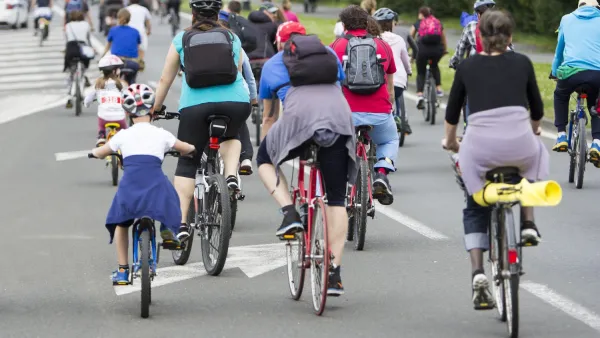In the 1960s and 70s, America witnessed a bike boom that sounds very similar to today's. Although it petered out, Tom Payne argues why contemporary circumstances have altered the long-term viability of a bicycling revolution.
As cities across the world seek to ease congestion and attract young professionals through investment in bicycle infrastructure, bike use is surging. "Portland hipsters are taking to the streets on fixies, east Londoners are dusting off vintage Raleighs and Sydney corporates are swapping golf clubs for lycra… As a result, the growth in cycling numbers has been immense in many cities worldwide," says Payne.
But unlike America's ‘bike boom’ of the late 60s and early 70s, which saw bike sales increase from 2.5 to 15 million between 1963-73, Payne thinks the current period of growth is sustainable. "We’re aware that we can no longer keep producing without recycling, we can no longer all own large homes, and we can no longer all drive to work – not only do our cars not all fit in our cities, but we are also running out of the very resource that drives them," he notes.
"The car will not simply disappear and bicycles will not suddenly take over our streets. But as we look for alternative solutions to our current transport woes, cycling is suddenly looking like a pretty smart option. Rather than just a fad, I’d argue that today’s boom will be sticking about for a while. Just like the revolution of a wheel, we are perhaps, returning to where it all began."
FULL STORY: Bicycle Revolution or Urban Fad?

Planetizen Federal Action Tracker
A weekly monitor of how Trump’s orders and actions are impacting planners and planning in America.

Maui's Vacation Rental Debate Turns Ugly
Verbal attacks, misinformation campaigns and fistfights plague a high-stakes debate to convert thousands of vacation rentals into long-term housing.

San Francisco Suspends Traffic Calming Amidst Record Deaths
Citing “a challenging fiscal landscape,” the city will cease the program on the heels of 42 traffic deaths, including 24 pedestrians.

Amtrak Rolls Out New Orleans to Alabama “Mardi Gras” Train
The new service will operate morning and evening departures between Mobile and New Orleans.

The Subversive Car-Free Guide to Trump's Great American Road Trip
Car-free ways to access Chicagoland’s best tourist attractions.

San Antonio and Austin are Fusing Into one Massive Megaregion
The region spanning the two central Texas cities is growing fast, posing challenges for local infrastructure and water supplies.
Urban Design for Planners 1: Software Tools
This six-course series explores essential urban design concepts using open source software and equips planners with the tools they need to participate fully in the urban design process.
Planning for Universal Design
Learn the tools for implementing Universal Design in planning regulations.
Heyer Gruel & Associates PA
JM Goldson LLC
Custer County Colorado
City of Camden Redevelopment Agency
City of Astoria
Transportation Research & Education Center (TREC) at Portland State University
Jefferson Parish Government
Camden Redevelopment Agency
City of Claremont





























